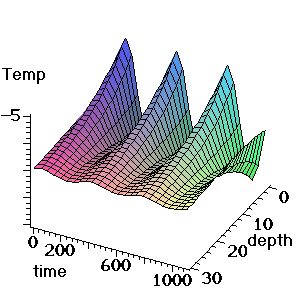Employers are looking for people who can solve problems, and who can solve problems better than a math grad?
Are you interested in mathematics, and wonder what sorts of jobs might be available to a mathematics or statistics graduate? Of course, you can go on to a career in teaching (and the job prospects for math teachers/professors are good) but did you know that you can also:
- Work as a member of a team that decides whether drugs are safe and effective before putting them on the market?
- Help the management of a corporation plan for the future?
- Work as a project manager in the telecommunications industry?
- Provide mathematical modeling expertise for an environmental consulting firm studying permafrost and oil wells?
- Work in hundreds of other jobs?

Permafrost temperature as a function of depth and time
Mathematics has always been the language of science and technology. As our society becomes increasingly technological, it becomes increasingly important to be able to speak and reason in that language. Those who do can find themselves very attractive employees.
Of course, mathematics is more than just a useful tool. Many people enjoy mathematics for its own sake. They find deep satisfaction and indeed beauty in its order, precision and complex structures.
The mathematics behind compact disk players, secure internet communications, and many other modern technologies began with mathematicians' curiosity. The discoveries of these explorers of "pure" mathematics never stay in the lab for long, however.
Studying math teaches you to reason, to look for patterns, to draw on previous knowledge and use models, to develop ideas and formulate new approaches and to draw logical conclusions - all skills that will serve you well in the working world.
More Information on Careers in Math & Stats
If you're interested in some specifics about what life as a career mathematician or statistician might be like, check out the websites listed below. As you do, notice that very often the mathematics or statistics is done in conjunction with another discipline (biology, computer science etc.) or in the context of business or industry. That means a mathematics degree combined with a minor/major in another area (say computer science, or business, or physics) can be a particularly effective degree combination.
Academic and Non-academic Careers
Mathematicians are everywhere, not just in the classroom! If you're interested in what they do, and in finding out what you could do, here are some interesting websites to explore. Please feel free to contact one of our faculty if you have some questions, or would like some advice.
- WeUseMath.org has a lot of information and examples of jobs that use mathematics training.
- Mathematical Sciences Career Information - A very interesting site with lots of information about jobs in industry and business. It includes profiles of many mathematics graduates, who describe how they use the mathematics they learned as students. The site also has a section listing all the applications of the mathematics you might be learning.
- Careers in Statistics. Statisticians are in demand!
- Mathematics Careers from the Mathematical Association of America.
- Math at Work
Careers in Teaching
The job prospects for high-school math teachers are very good, (see below) and there are seats available for in the provincial PDP programs for Math teachers!
Teaching mathematics at a high-school level generally requires at least a bachelor's degree in mathematics. Many students prepare for this by obtaining their degree and then following up with a one-year Professional Development Program (PDP) at an institution like Simon Fraser University . As for non-academic careers, it can be particularly effective to combine your mathematics study with another area (have more than one "teachable area".) UFV's Bachelor of Science and Bachelor of Arts degrees give you a great deal of flexibility in making your educational plan.
For those interested in university/college (academic) positions as math professors, at least a Master's degree and most often a PhD is required.
